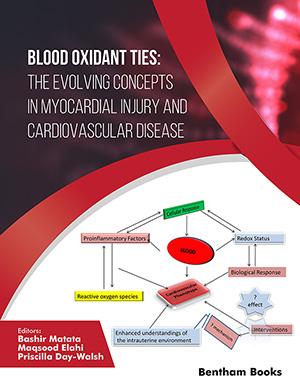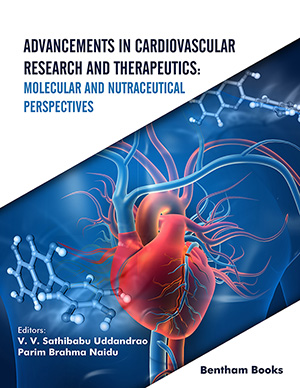
Abstract
Anticoagulation is indicated in most cardioembolic ischemic strokes for secondary prevention. In many cardiac conditions, anticoagulation is also indication for primary stroke prevention, mainly when associated to vascular risk factors. Anticoagulation should be started as soon as possible, as it is safe even in moderate acute strokes. The efficacy of early anticoagulation after cardioembolic stroke in relation to outcome has not been assessed adequately, but there is evidence from animal models and clinical studies that anticoagulation with unfractionated heparin is associated with a better outcome mediated in part by its anti-inflammatory properties.
Keywords: Anticoagulation, heparin, oral anticoagulants, prevention, inflammation
Current Cardiology Reviews
Title: Antithrombotic Therapy in Cardiac Embolism
Volume: 6 Issue: 3
Author(s): Alvaro Cervera and Angel Chamorro
Affiliation:
Keywords: Anticoagulation, heparin, oral anticoagulants, prevention, inflammation
Abstract: Anticoagulation is indicated in most cardioembolic ischemic strokes for secondary prevention. In many cardiac conditions, anticoagulation is also indication for primary stroke prevention, mainly when associated to vascular risk factors. Anticoagulation should be started as soon as possible, as it is safe even in moderate acute strokes. The efficacy of early anticoagulation after cardioembolic stroke in relation to outcome has not been assessed adequately, but there is evidence from animal models and clinical studies that anticoagulation with unfractionated heparin is associated with a better outcome mediated in part by its anti-inflammatory properties.
Export Options
About this article
Cite this article as:
Cervera Alvaro and Chamorro Angel, Antithrombotic Therapy in Cardiac Embolism, Current Cardiology Reviews 2010; 6 (3) . https://dx.doi.org/10.2174/157340310791658749
| DOI https://dx.doi.org/10.2174/157340310791658749 |
Print ISSN 1573-403X |
| Publisher Name Bentham Science Publisher |
Online ISSN 1875-6557 |
Call for Papers in Thematic Issues
Advances in Managing Cardiogenic Shock and the Value of Percutaneous Mechanical Circulatory Support.
Despite the advances in cardiology, the outcomes of patients with cardiogenic shock remain poor. There is an increasing interest and use of mechanical circulatory support for patients with cardiogenic shock. Additionally, the complexity of coronary interventions has increased during the last decade with the potential of treating more high-risk patients ...read more
The era of cardiac medication and implantable devices therapy in heart failure treatment continues
The heart failure (HF) remains a serious public health problem and affects 64 million people worldwide. Although advances in medical therapy and device assistance have significantly improved HF outcomes, the implications of HF are still dramatic. In recent years, innovative developments have been made in HF treatment management, based on ...read more
Related Journals
 7
7
- Author Guidelines
- Graphical Abstracts
- Fabricating and Stating False Information
- Research Misconduct
- Post Publication Discussions and Corrections
- Publishing Ethics and Rectitude
- Increase Visibility of Your Article
- Archiving Policies
- Peer Review Workflow
- Order Your Article Before Print
- Promote Your Article
- Manuscript Transfer Facility
- Editorial Policies
- Allegations from Whistleblowers
- Announcements
Related Articles
-
The Role of Statins in the Activation of Heme Oxygenase-1 in Cardiovascular Diseases
Current Drug Targets Adiponectin and Cardiovascular Disease: Mechanisms and New Therapeutic Approaches
Current Medicinal Chemistry PET Imaging of Beta-Adrenoceptors in Human Brain: A Realistic Goal or a Mirage?
Current Pharmaceutical Design Peripheral Heart Blocks Associated with Myocardial Infarcts: Clinical Diagnosis Based on Experimental Findings
Current Cardiology Reviews Heart Failure in Sub-Saharan Africa
Current Cardiology Reviews Toll-Like Receptors and Myocardial Ischemia/Reperfusion, Inflammation, and Injury
Current Cardiology Reviews Fibrosis as a Therapeutic Target Post-Myocardial Infarction
Current Pharmaceutical Design Clinical Applications and Biosafety of Human Adult Mesenchymal Stem Cells
Current Pharmaceutical Design Biological Activities of Receptor-interacting Protein 140 in Adipocytes and Metabolic Diseases
Current Diabetes Reviews The Biochemical Mechanisms of T-Cell Anergy
Current Immunology Reviews (Discontinued) State of the Heart: CMR in Coronary Artery Disease
Current Medical Imaging Targeting the AMP-Activated Protein Kinase for the Treatment of Type 2 Diabetes
Current Drug Targets - Immune, Endocrine & Metabolic Disorders Role of Chemokines and Trafficking of Immune Cells in Parasitic Infections
Current Immunology Reviews (Discontinued) Triglyceride Level Affecting Shared Susceptibility Genes in Metabolic Syndrome and Coronary Artery Disease
Current Medicinal Chemistry Current Indications for Implantable Cardioverter Defibrillators in Non-Ischemic Cardiomyopathies and Channelopathies
Reviews on Recent Clinical Trials Streptozotocin-Induced Diabetes Mellitus in Neonatal Rats: An Insight into its Applications to Induce Diabetic Complications
Current Diabetes Reviews Assessment of Coronary Microcirculation with Myocardial Contrast Echocardiography
Current Pharmaceutical Design The Use of Anthracyclines for Therapy of CNS Tumors
Anti-Cancer Agents in Medicinal Chemistry MCP-1/CCL2 as a Therapeutic Target in Myocardial Infarction and Ischemic Cardiomyopathy
Inflammation & Allergy - Drug Targets (Discontinued) Incidence and Management of Carfilzomib-induced Cardiovascular Toxicity; A Systematic Review and Meta-analysis
Cardiovascular & Hematological Disorders-Drug Targets














